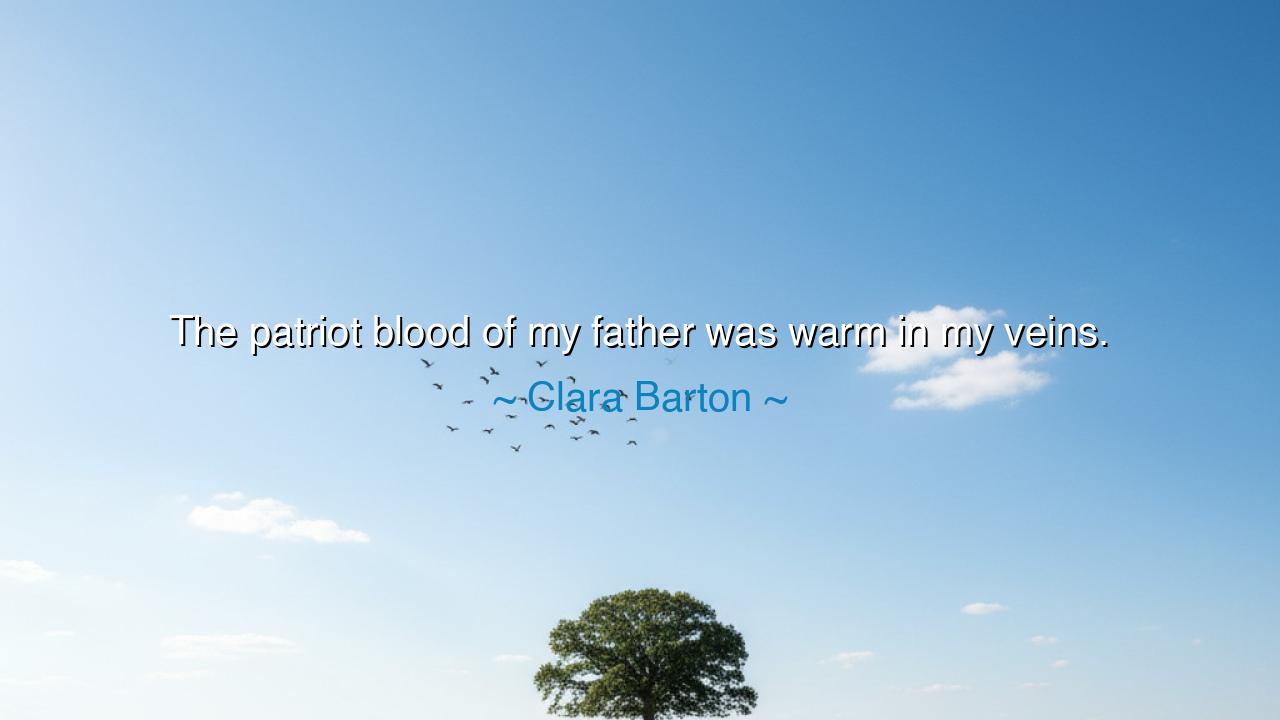
The patriot blood of my father was warm in my veins.






Clara Barton, the “Angel of the Battlefield,” once spoke words that echo like a sacred hymn across the corridors of history: “The patriot blood of my father was warm in my veins.” In this utterance, she revealed that the fire of devotion to one’s land and people is not merely chosen in a single moment, but often inherited like a holy flame passed from one generation to the next. Patriot blood is more than red fluid in the body; it is a current of courage, of loyalty, of unyielding love for the homeland, carried forward from fathers to daughters, from mothers to sons, through the very veins of time.
To understand her words, we must recall the soil from which they sprang. Clara Barton was the daughter of Captain Stephen Barton, a soldier who served in the Revolutionary War. His tales of duty, his example of service, and his steadfast devotion to the fledgling republic poured into the heart of his young daughter like streams feeding a river. From him she received not only life, but also spirit—the inheritance of patriot blood that pulsed in her body and shaped her destiny. Thus, when war and suffering came, she did not hesitate to give her life to serve others, for the warmth of her father’s blood still glowed within her.
This truth is not hers alone, but a truth for all peoples. History is filled with sons and daughters who drew upon the courage of their ancestors. Consider the story of Leonidas of Sparta, who stood at Thermopylae. He carried not only his own resolve but also the accumulated honor of generations of warriors who had bled for Greece. It was not merely his sword that stood against Persia’s vast horde—it was the patriot blood of fathers who had trained him, taught him, and lived before him. So it was with Barton. So it has always been.
But there is more. Clara Barton did not wield sword or spear; her battlefield was filled with the cries of the wounded and the dying. Yet the same patriot blood that drove her father to defend the nation with arms moved her to defend it with mercy. For patriotism is not only the courage to kill, but also the courage to heal, to bind wounds, to preserve the living so that freedom might not perish with them. She proved that patriotism has many forms—each flowing from the same source of devotion to country and humanity.
And so, we see that patriot blood is both inheritance and choice. Many may receive it, but only those who awaken it within themselves make it live. Barton chose to let the blood run hot, to let it call her into service. Others may choose to let it cool, to forget the sacrifices of their ancestors. But those who honor it—those who let it speak within them—become the bridge between the past and the future, carrying the fire of their fathers into the light of tomorrow.
The lesson is clear: remember your lineage, and honor the sacrifices that have given you life and freedom. You need not be a soldier to prove your patriotism; like Barton, you may serve through compassion, through courage, through devotion to your people’s welfare. Ask yourself: what have I inherited, and how will I spend it? For to waste the blood of your fathers is to betray them, but to let it burn within you is to become part of an unbroken chain of honor.
Therefore, take up this call. Study the stories of your ancestors. Speak of their courage to your children. Serve your community, whether in times of war or peace. Let your patriotism be more than words—it must live in your actions, in your sacrifices, in your compassion. For in every generation, the patriot blood waits to be stirred, to be warmed, to be proven in deeds worthy of those who came before.
So let us end where Barton began: with the warmth of her father’s blood. May we, too, feel in our veins the pulse of those who gave us life, freedom, and hope. And may we rise, not as solitary figures, but as heirs of all their sacrifice—ready to pour forth our own courage, our own devotion, so that future generations may say of us: their patriot blood still burns in ours.






AAdministratorAdministrator
Welcome, honored guests. Please leave a comment, we will respond soon